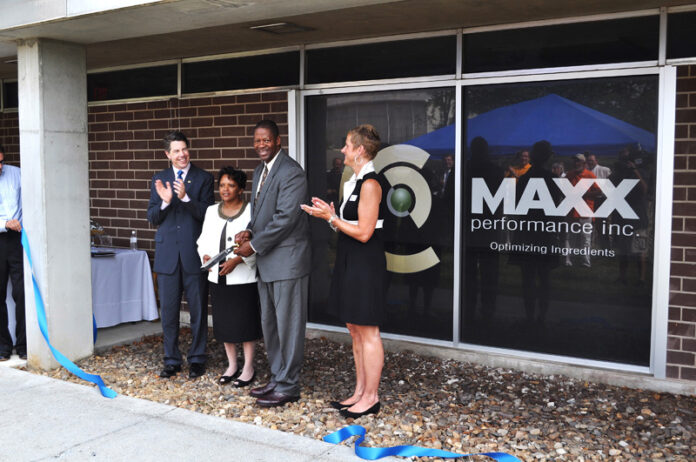
by Gene Marrano
Roanoke City officials welcomed another new business to the valley with a ribbon cutting for Maxx Performance, a provider of microencapsulation – materials that can improve the taste of food and the efficiency of animal feed.
The Roanoke research and development facility on Aerial Way will create 12-15 jobs over the next few years, and will also offer opportunities for students from Virginia Tech.
Increasing the ties between Virginia Tech / Blacksburg and Roanoke has long been a goal for economic development officials here – how to bridge that 40 mile divide along I-81? Businesses like Maxx Performance are part of the answer.
The man behind Maxx Performance—Winston Samuels—is a Hokie himself who lives in Blacksburg. The Jamaican born Samuels is in the process of moving Maxx Performance to Roanoke, shutting down a corporate office in upstate New York. He and his wife Marilyn have put one son through Virginia Tech, with another son currently attending Tech.
“Roanoke now has all of the manufacturing as well as the [research and development],” said Samuels of his company. Microencapsulates are used for industrial applications, and to do such things as control the release of sodium bicarbonates in bread and bakery products, allowing for longer shelf life. “Companies like Pillsbury and General Mills, when they ship products across the country, they will have a longer shelf life,” notes Samuels, who has a background in the animal industry.
Maxx Performance also makes coatings for animal feed that promote stability with enzymes used in the feed, and increases their effectiveness, so that “the time to market is shorter. It allows the end user … to cut back on the use of materials like antibiotics.”
Another product masks the bitter taste of green tea extracts, which have documented health benefits. “[That] allows it to be used in baked goods,” said Samuels, who has a Ph.D. in animal sciences from Virginia Tech.
“It’s a proprietary technology I was exposed to in my former life. I wanted to develop this,” said Samuels, “to find a way to stabilize products.” He added that “Virginia Tech has been a leader in this field,” noting work done by the school using fish byproducts for cattle feed.
Some employees in Roanoke come from Virginia Tech, while others are current students taking part in a work-study program. “They work side by side [with paid employees] and get to see how businesses are run. We are giving them hands on experience.”
Samuels has a goal for Maxx Performance: “We want to tap in to the brightest minds at Virginia Tech. It’s a good win-win situation for both [parties]. It’s a good fit – [and] we’re Hokies.”
Samuels has heard some negative things about the workforce in Roanoke – how manufacturing employees demand high wages without having the technical skills needed. He doesn’t mind paying higher salaries but offers a challenge: “you haven’t proven anything to me yet. Come in and prove something to me.”
Roanoke residents looking for high-tech jobs at places like Maxx Performance have to answer this question first, according to Samuels: “What can I do for this company? See it as an opportunity, not just as a job.”
Samuels said Maxx Performance might provide a spark that others can follow, inspiring them to set up companies in Roanoke that can attract the best and brightest from Virginia Tech in Blacksburg.”
We’re a real world manufacturing company. Blacksburg is right down the street.” Workers from the Roanoke area can benefit as well. “The biggest challenge is a trained workforce that wants to come to work and sees it as an opportunity – and [will ultimately] be rewarded.”

